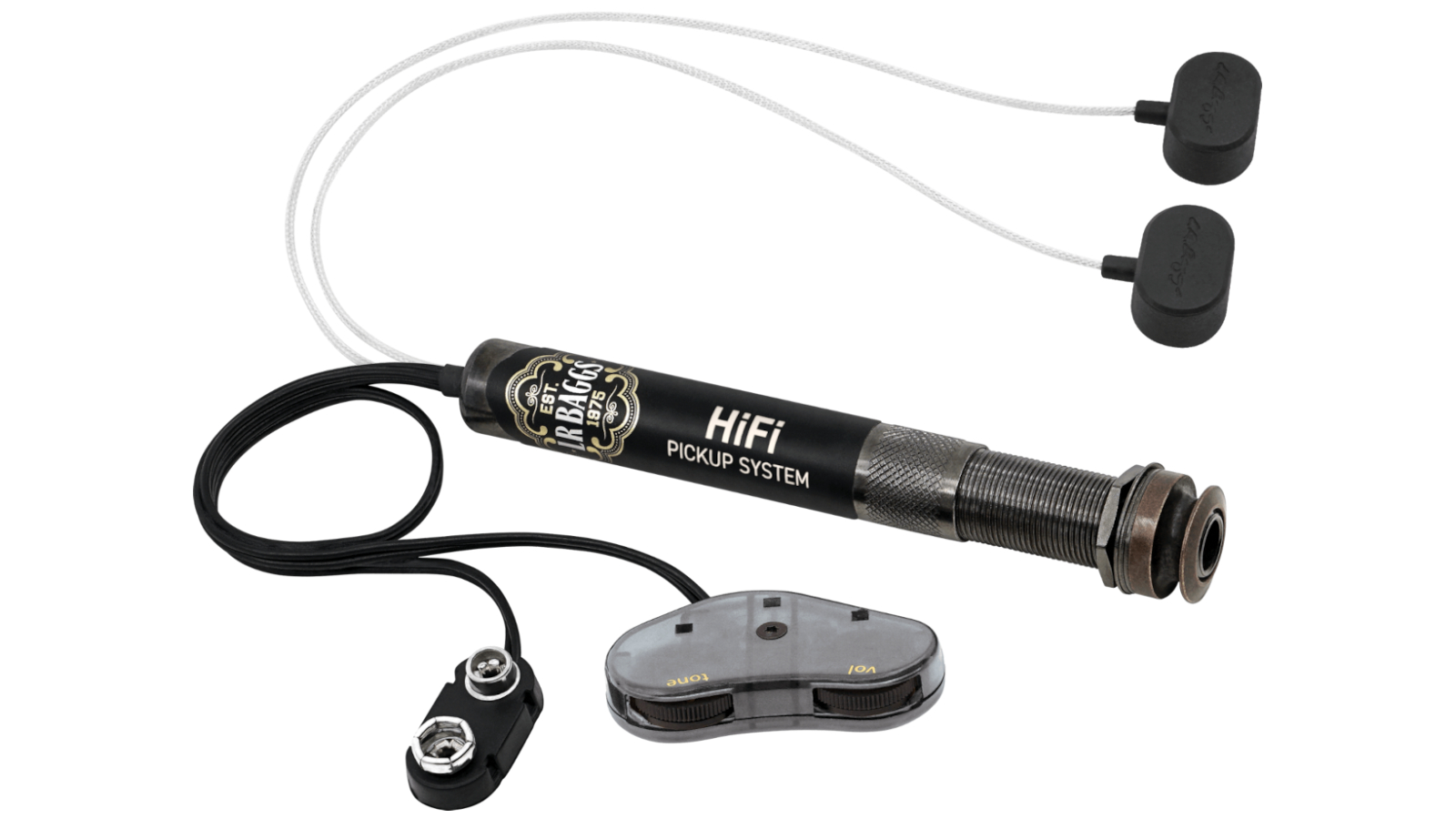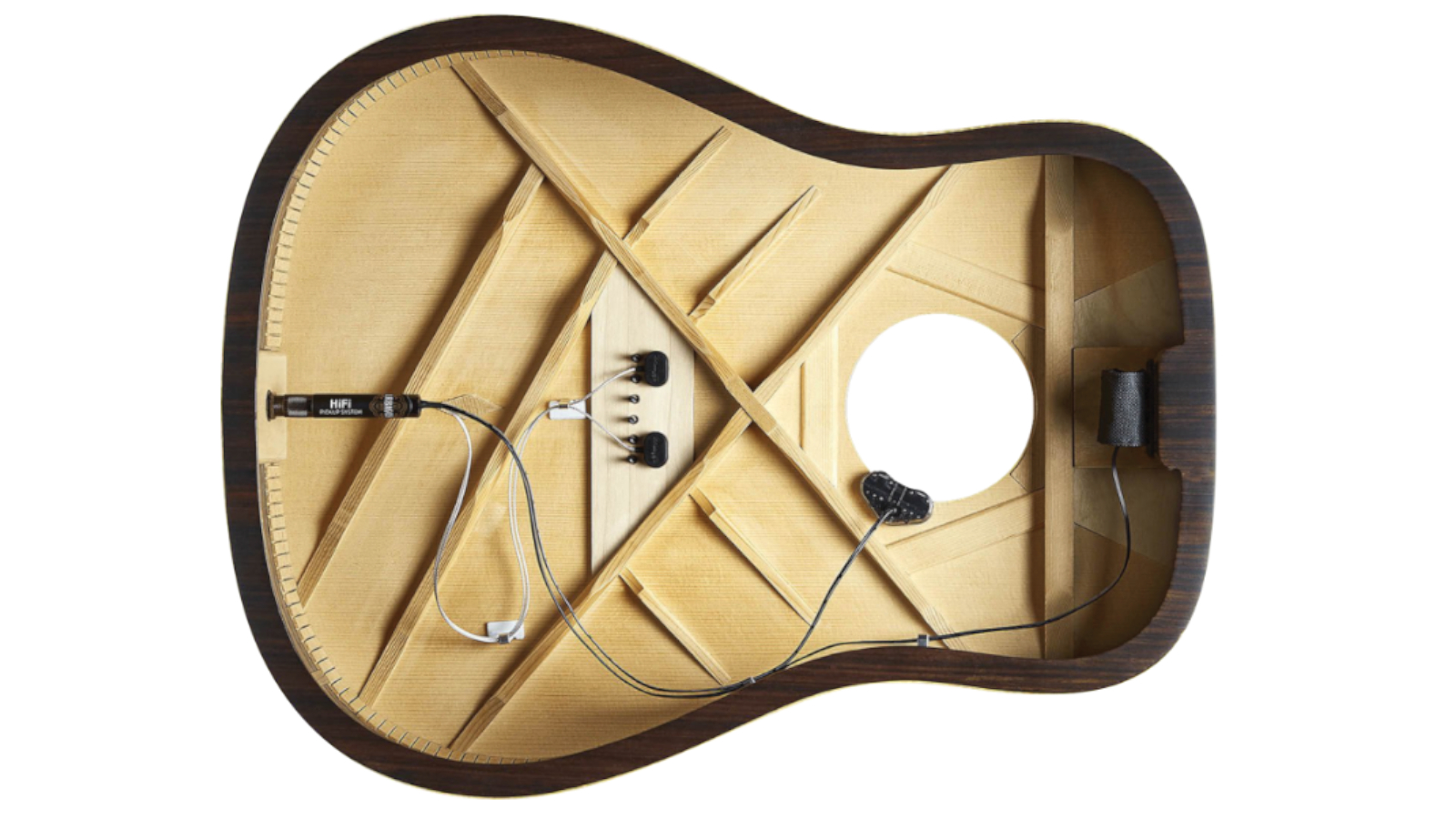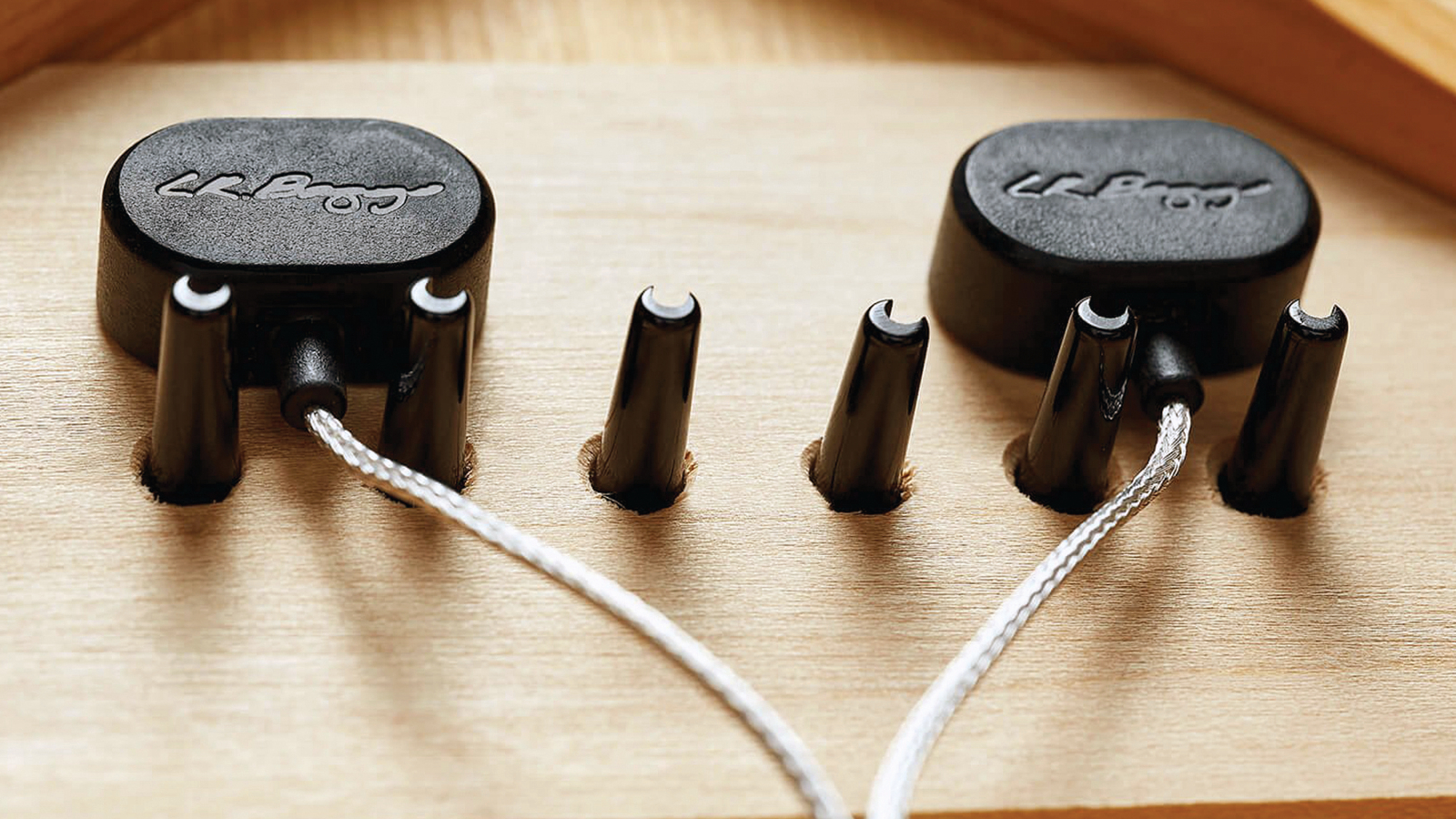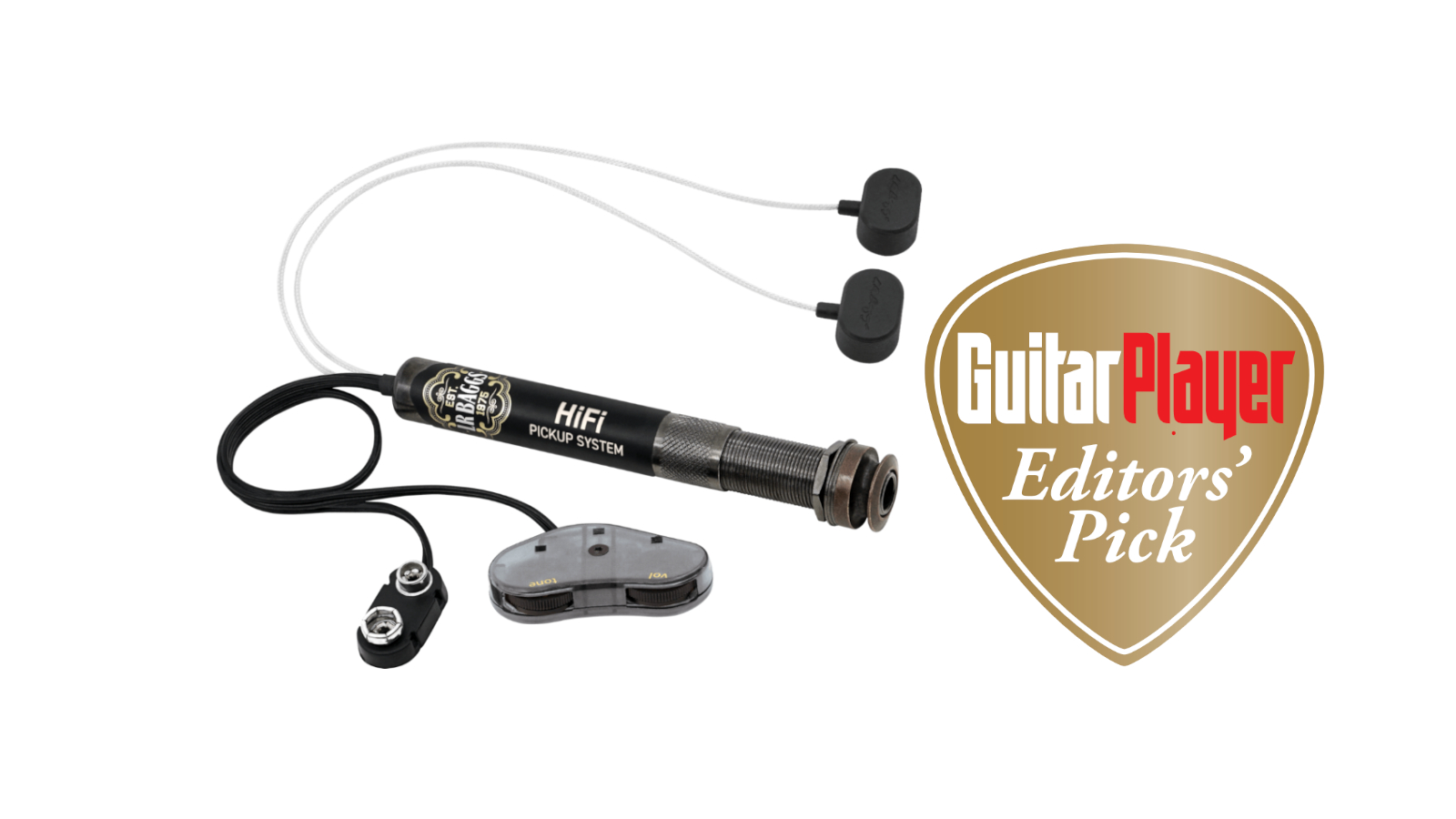GuitarPlayer Verdict
A simple and affordable plug-and-play system that bottles a guitar’s acoustic essence and electrifies it in unique fashion for a remarkably vivacious and organic tone
Pros
- +
Remarkably high-fidelity 3D tone is uber responsive
- +
Simple, secure non-invasive installation
- +
Strong value
Cons
- -
Installation needs to be just right
- -
Tone could be a bit too brilliantly responsive and revealing for some players and instruments
You can trust Guitar Player.
The new HiFi active acoustic bridge-plate pickup system could represent a sea change, both at Baggs and throughout the industry. It’s different from traditional systems, such as the venerable Baggs Element, which use an undersaddle piezo pickup. In the HiFi system, a pair of transducers adhere non-invasively under the bridge plate, while a high-fidelity preamp sculpts the output signal. The design delivers a balance of string and body energy for a holistic tone that fully represents the unique qualities of a particular acoustic guitar.
According to Baggs, the HiFi is the next-level version of the company’s iBeam active bridge-plate pickup system, as well as a response to a challenge thrown down about a quarter century ago by Lloyd Baggs’ friend Jackson Browne, a notorious tone chaser.
HiFi’s installation is not particularly complicated and, significantly, requires no glue or epoxy. However, if those peel-and-stick transducers aren’t affixed perfectly flush under the bridge plate, the sound will be shrill, so the job is best handled by a professional. I had mine done by Phil “Philbillie” Milner, who is Bob Weir’s former tech and all-around guitar and amp fixer of note in Northern California. He put HiFi in a stunning Martin CS-SC-2022.
The straightforward system includes the endpin preamp, a nine-volt battery pack, and a pair of sound hole-mounted volume and tone flywheels. I recorded the guitar into a digital audio workstation for direct comparisons to the Martin’s previous piezo-based system. I also ran it through a variety of amps at home and used it on a couple of gigs.
Each situation yielded unique revelations, but one thing was consistently obvious: HiFi is indeed a high-fidelity acoustic experience. Recorded tones sounded clear and open, with HiFi delivering a full frequency range in transparent, unfiltered fashion. It was easily more organic than the under-saddle piezo system it replaced.
Through an amp? Well, such a high level of responsiveness to every touch and tap shouldn’t be possible without encountering feedback, especially at considerable volume. But feedback wasn’t an ordeal, even on a loud solo gig in a rather large room.

I also had a Baggs M1 passive sound-hole pickup running through gain pedals into a Gibson 2x12 tube amp, and a hot vocal running right alongside the HiFi’s signal into a Baggs Synapse Personal P.A. situated directly behind me. It fed a pair of main P.A. speakers, and the sound was bouncing all around the room. Using a wide variety of plucking approaches, from nuanced fingerpicking to aggressive percussive playing, I found the system kept feedback at bay and remained securely in place.
All the latest guitar news, interviews, lessons, reviews, deals and more, direct to your inbox!
I did have to adjust my approach to accommodate such a vivacious sound. First, I rolled the tone down, then I grabbed some bass boost from a Baggs Align Series Equalizer pedal, because the SC is a rather thin-bodied performance acoustic. I wound up using more variety in the plucking approach, because HiFi is so sensitive and pristine that every subtlety – mistakes included – is audible. Since I wear fake nails, I had to become extra conscious of how much nail, versus flesh, hit the strings, and extra judicious in the overall approach, because the whole guitar became boisterous.
Slappers and tappers will be glad to hear that HiFi is a percussive player’s dream! It simply takes some getting used to, like going from standard video quality to HDTV. I wound up using the flesh of my thumb for an intimate sound on, say, a subdued verse part before wailing away with a full hand on a driving chorus. Whatever you put in is going to shine through, similar to how electric aficionados talk about playing through a Dumble amp – it’s very revealing.
HiFi’s performance is wide open and unbridled, and I had to learn how to harness that power in such a high-fidelity guitar. I loved complementing it with an M1 passive magnetic in the sound hole, which added a bit more string sound to the HiFi’s bountiful body tones. The Martin SC has a glacial cutaway, so you can play way up the neck. Higher notes on the first two strings lacked resonance and were somewhat plinky with the HiFi alone, but the M1 helped deliver those notes with plenty of pop.

I visited Baggs’ headquarters to hear how HiFi sounded in several other guitars, and the main takeaway was that each sounded uniquely like itself. To take that endeavor as far as possible, the Baggs team also utilized its Voiceprint D.I. to create custom filters based on each instrument’s particular body tone and pickup signal. The results sounded so realistic that one couldn’t help but wonder who is going to prefer an under-saddle piezo, be it the Baggs Element or any other make and model.
Even piezo system tones near the $200 price point have some plastic-sounding quack, a quality that’s not present with the HiFi. That said, HiFi might sound a bit too present and dynamically responsive in some players’ hands and instruments. Onboard control is limited, and while the tone control works wonders, I appreciated having some help from a tone-sculpting pedal. In addition, I love the sound of HiFi in conjunction with the M1, which creates a very flexible dual system, as sound-hole pickups work well through all sorts of amplification.
Are we at the beginning of the end of the piezo age? I’d bet Baggs believes so. HiFi is a simple and affordable plug-and-play system that bottles a guitar’s acoustic essence and electrifies it in unique fashion for a remarkably vivacious and organic tone. It’s kind of like a cross between a mic and a hot, sensitive pickup, but without the insane feedback issues. For ushering in a new chapter at one of the most innovative companies in the acoustic-electric arena, HiFi earns an Editors’ Pick Award.

Specifications
- CONTROLS: Volume and tone
- POWER: 9-volt battery
- BUILT: USA (with some parts sourced overseas)
Visit L.R. Baggs for more information.
Jimmy Leslie is the former editor of Gig magazine and has more than 20 years of experience writing stories and coordinating GP Presents events for Guitar Player including the past decade acting as Frets acoustic editor. He’s worked with myriad guitar greats spanning generations and styles including Carlos Santana, Jack White, Samantha Fish, Leo Kottke, Tommy Emmanuel, Kaki King and Julian Lage. Jimmy has a side hustle serving as soundtrack sensei at the cruising lifestyle publication Latitudes and Attitudes. See Leslie’s many Guitar Player- and Frets-related videos on his YouTube channel, dig his Allman Brothers tribute at allmondbrothers.com, and check out his acoustic/electric modern classic rock artistry at at spirithustler.com. Visit the hub of his many adventures at jimmyleslie.com


